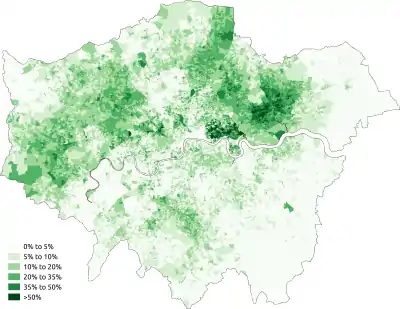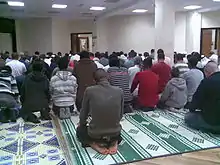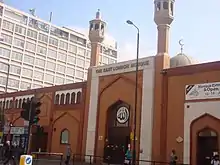Islam in London
There were 1,012,823 Muslims reported in the 2011 census in the Greater London area.[1] In the 2011 census Office for National Statistics, the proportion of Muslims in London had risen to 12.4% of the population (21% of England's Muslims). In the boroughs of Newham and Tower Hamlets, the percentages of Muslims were over 30%.
History

The first Muslims to settle in London were lascars, that is, Bengali and Yemeni sailors from the 19th century. Many Muslims from the Indian sub-continent served in the British Army and British Indian Army in the First and Second World Wars. In the wave of immigration that followed the Second World War, many Muslims emigrated to the UK from these Commonwealth countries and former colonies. Following the partition of India, many came from Pakistan especially the Punjab and Azad Kashmir in addition to the Indian state of Gujarat. This initial wave of immigration of the 1950s and 60s was followed by migrants from Cyprus, Sylhet Bangladesh, formerly East Pakistan. Many Muslims also arrived from various other countries, although the percentage is far smaller than from South Asia. Amongst those from other countries, Muslims from Yemen, Somalia and Turkey have significant numbers, whereas those from Malaysia, Nigeria, Ghana and Kenya represent smaller fractions. Today, London's Muslims come from all over the world and there is a small but growing group of converts.
21st century
Most of London's Muslims are descendants of immigrants from the South Asia, particularly Pakistan, Bangladesh, Afghanistan and India. There is also a large number of Muslims from Arab countries. Among African Muslims there are large Maghreb (including Algerian and Egyptian) communities and Somali communities, as well as the equally large 200,000 members of the West African Muslim community. In addition, London is home to large Turkish, Albanian and Bosnian Muslim communities, both of which comprise over 30,000 members. The city also has a high number of restaurants that serve halal food (around 2,300).
However, this influx of immigrants has led to community relations issues. In the East End of London, there is a lot of tension in the area around East Ham, Barking and Dagenham between Muslims and non-Muslims. The anti-immigrant British National Party gained their highest vote by proportion, 16.9%, in the 2005 general election in Barking.[2] There are several popular Muslim communities within London, however North London's City of Westminster has an extremely strong Muslim population specifically Edgware and Islington.[3]
In 2013, it was reported there were 13,400 Muslim-owned businesses in London, creating more than 70,000 jobs and representing just over 33% of Small to Medium Enterprises in London.[4]
Notable mosques and other institutions
The mosque is first and foremost a place of prayer. There are estimated to be almost 2,000 mosques and Islamic prayer rooms in the UK, serving 4.1 million Muslims, or 6.3% of the UK population. About 1500 of those Mosques were located in London as of 2016. These mosques in the UK range from humble and small 'house mosques' in residential areas to larger, purpose built mosques such as Regents Park Mosque in London (discussed below).[5]
London's first Mosque opened by Hajie Mohamed Dollie in 1895, Albert Street, modern Camden. Prof. Ron Geeves states this in his biography of Abdullah Quilliam. The Mosque relocates to Euston Road in 1899 where the present Wellcome Collection stands. Mohamed Dollie was of Scottish and Malay ancestry. Furthermore, it is the subject of a forthcoming documentary with Muslim History Tours.[6][7][8] Mohamed Dollie died in 1906 and is buried at the New Willesden Cemetery with a new headstone. The West London Islamic Centre was honoured to be part of community-led collaboration with Muslim History Tours,[9]

The first purpose-built mosque in London is in Southfields, Wandsworth. The Fazl Mosque was inaugurated in 1926 as a project of the Ahmadiyya community of Qadian, India. Since 1984, the mosque and its surrounding buildings have been the residence of the Khalifatul Masih caliphs and therefore, the international headquarters of the Community.
One of the first large mosques was on Brick Lane, in a listed building which started life as a church in the 18th century and was converted into a synagogue in the 19th, reflecting the changing waves of immigration, from Huguenots to Eastern European Jews to Bengalis. Soon after the Brick Lane Mosque opened, two large mosques were built, the East London Mosque (with the adjoining London Muslim Centre and Maryam Centre) on Whitechapel Road not far from Spitalfields, and the London Central Mosque in Regent's Park.
Other mosques in Inner London include the Brixton Mosque, in the midst of an Afro-Caribbean area, and the Finsbury Park Mosque (also known as the North London Central Mosque).
The Suleymaniye Mosque on Kingsland Road serves a largely Turkish community. Named after the famous landmark in Istanbul, it was purpose-built and opened in 1999. Shacklewell Lane Mosque was the first Turkish mosque in the United Kingdom.[10] It was established by Turkish Cypriots in 1977, also in a converted synagogue.[11][12] The nearby Aziziye Mosque in Stoke Newington was converted from a cinema.
In Outer London are the Croydon Mosque, the very large Baitul Futuh Mosque in Merton, and the Abbey Mills Mosque in Stratford. Also notable are the Central Mosque Wembley, Leytonstone Mosque, and Harrow Central Mosque.
The Islamic Centre of England is an educational establishment that opened in 1998. London is also home to The Islamic College, a college and university which offers A-levels, BA, and MA degrees in coordination with Middlesex University.

Islamophobia in London
Police forces recorded 110 hate crimes directed at Muslim places of worship (Mar.-Jul. 2019) This number is up from 47 over the same six-month period in 2016; attacks have doubled over past year.[13] For example, last year, a jury convicted a man of murder after he drove a van into Muslim worshipers outside a London mosque, killing one person and injuring nine others. Overall, the number of anti-Muslim hate crimes reported across Britain increased by 593% after the Christchurch shooting. The British government has been making vast efforts to reduce these deadly attacks.[14]
See also
References
- "Table KS209EW: 2011 Census: Religion, local authorities in England and Wales". Office for National Statistics. 11 December 2012. Retrieved 13 January 2021.
- Milmo, Cahal (20 April 2006). "How the BNP is gaining ground in Barking with a campaign of lies and distortions". The Independent. London. Retrieved 5 May 2010.
- "London Population Census 2011" (PDF). London House of Commons.
- "London's Mecca rich: the rise of the Muslim multi-millionaires".
- correspondent, Harriet Sherwood Religion (13 March 2018). "London Central mosque given Grade II* listed status". The Guardian. ISSN 0261-3077. Retrieved 3 December 2019.
- https://londonist.com/london/history/a-tour-guide-has-discovered-london-s-oldest-mosque
- https://ilmfeed.com/hadji-mohammad-dollie-man-founded-londons-first-mosque/
- http://canstream.co.uk/camden/index.php?id=876
- http://www.wliconline.org/index.php?state=2&id=414&cat=10. Missing or empty
|title=(help) - Geaves, Ron (2001), "The Haqqani Naqshbandi: A Study of Apocalyptic Millennnialism within Islam", in Porter, Stanley E.; Hayes, Michael A.; Tombs, David (eds.), Faith in the Millennium, Sheffield Academic Press, ISBN 1-84127-092-X.
- Çoştu, Yakup (2004), "Londra'da Türklere Ait Dini Organizasyonlar" (PDF), Hitit Üniversitesi İlahiyat Fakültesi Dergisi, Hitit University, 8 (16): 77–100, archived from the original (PDF) on 17 March 2012
- Weinreb, Ben; Hibbert, Christopher; Keay, Julia; Keay, John (2010), The London Encyclopedia, Macmillan, ISBN 1-4050-4925-1
- "Hate crime targeting UK mosques more than doubled in past year". The Independent. 9 October 2017. Retrieved 3 December 2019.
- "Islamophobic incidents rocket by 600% in UK during week after New Zealand terror attack". The Independent. 23 March 2019. Retrieved 3 December 2019.
External links
- Reassessing what we collect website – Muslim London History of Muslim London with objects and images
- Subject Guide on Islam in London
